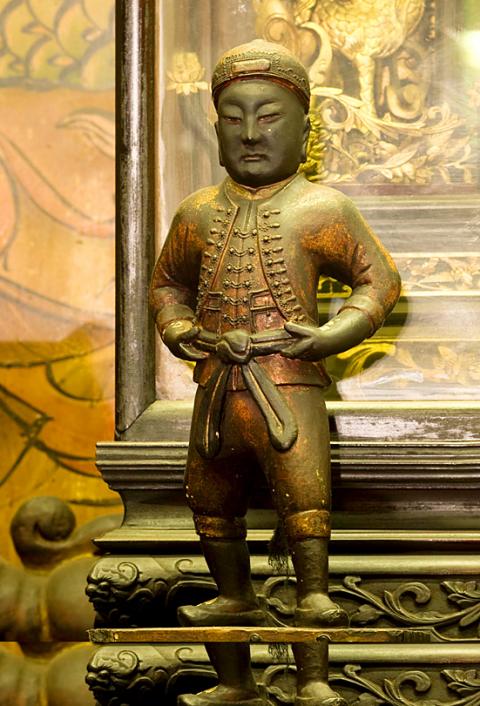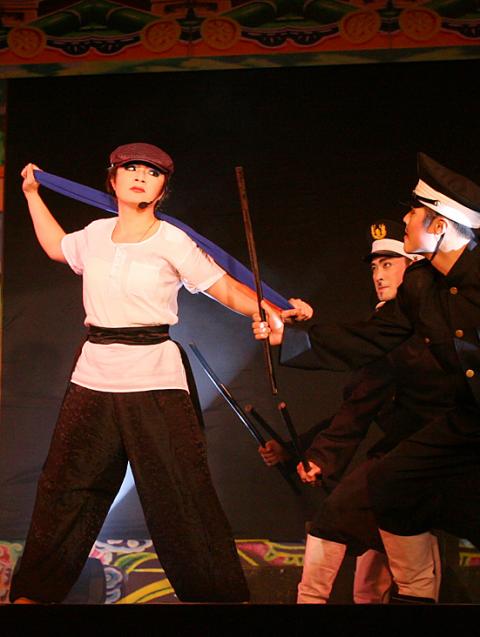At a time when the gap between rich and poor is growing, housing is increasingly out of reach for the middle class, and the government seems to favor large corporations, it’s no surprise that the story of “Taiwan’s Robin Hood” (台灣羅賓漢) still resonates.
Xia Hai City God Temple (霞海城隍廟), located in Dadaocheng’s (大稻埕) historical Dihua Street (迪化街), will hold events on Monday to pay homage to Liao Tien-ding (廖添丁), a celebrated outlaw active in Taiwan over a century ago who was the bane of Japanese authorities and wealthy families that benefited from the colonial government’s largesse.
A prayer ritual will also be held at 10am on Sunday at Hanmin Temple (漢民祠) in Bali District (八里), New Taipei City. The temple was built in Liao’s honor.

Photo courtesy of Xia Hai City God Temple
Xia Hai temple spokesperson Titan Wu (吳孟寰) said Liao’s exploits, which include killing a police informer in Keelung (基隆), robbing tea merchants in Shilin (士林) and stealing guns and ammo from a police station in Dadaocheng, have led many to dub him “Taiwan’s Robin Hood” because he stood up to the colonial rulers and divided his booty among the poor.
Wu said that one legend relates how Liao stole money from a wealthy merchant in Dadaocheng and placed the loot under a table inside Xia Hai City God Temple.
“He then told temple officials to distribute the money to the poor people squatting outside the temple,” Wu said.

Photo courtesy of Xia Hai City God Temple
He added that many in contemporary society could learn something from Liao’s public-spiritedness.
“Today’s social order is extremely chaotic, and people have little sense of morality. [Liao] can serve as an example for people to follow,” Wu said.
Monday’s events kick off at 10am with a prayer ceremony to Liao at Xia Hai. At 12pm, the temple will distribute red turtle cakes (紅龜粿), a pastry made from glutinous rice and sugar that many believe can ward off evil and bring prosperity, Wu said.
Celebrations end with an opera by Yihsin Opera Troupe (一心歌仔戲劇團) relating the life and times of Liao. The free performance, located next to the temple at Yongle Square (永樂廣場), begins at 7pm.
Born in 1885 to a peasant family in what is now Greater Taichung, Liao is said to have mastered martial arts at a young age before embarking on his adventures throughout northern Taiwan. Police eventually caught up with him at his hideout on Bali’s Guanyin Mountain (觀音山) in November 1909, where he was gunned down in a shootout.

Towering high above Taiwan’s capital city at 508 meters, Taipei 101 dominates the skyline. The earthquake-proof skyscraper of steel and glass has captured the imagination of professional rock climber Alex Honnold for more than a decade. Tomorrow morning, he will climb it in his signature free solo style — without ropes or protective equipment. And Netflix will broadcast it — live. The event’s announcement has drawn both excitement and trepidation, as well as some concerns over the ethical implications of attempting such a high-risk endeavor on live broadcast. Many have questioned Honnold’s desire to continues his free-solo climbs now that he’s a

As Taiwan’s second most populous city, Taichung looms large in the electoral map. Taiwanese political commentators describe it — along with neighboring Changhua County — as Taiwan’s “swing states” (搖擺州), which is a curious direct borrowing from American election terminology. In the early post-Martial Law era, Taichung was referred to as a “desert of democracy” because while the Democratic Progressive Party (DPP) was winning elections in the north and south, Taichung remained staunchly loyal to the Chinese Nationalist Party (KMT). That changed over time, but in both Changhua and Taichung, the DPP still suffers from a “one-term curse,” with the

Lines between cop and criminal get murky in Joe Carnahan’s The Rip, a crime thriller set across one foggy Miami night, starring Matt Damon and Ben Affleck. Damon and Affleck, of course, are so closely associated with Boston — most recently they produced the 2024 heist movie The Instigators there — that a detour to South Florida puts them, a little awkwardly, in an entirely different movie landscape. This is Miami Vice territory or Elmore Leonard Land, not Southie or The Town. In The Rip, they play Miami narcotics officers who come upon a cartel stash house that Lt. Dane Dumars (Damon)

Today Taiwanese accept as legitimate government control of many aspects of land use. That legitimacy hides in plain sight the way the system of authoritarian land grabs that favored big firms in the developmentalist era has given way to a government land grab system that favors big developers in the modern democratic era. Articles 142 and 143 of the Republic of China (ROC) Constitution form the basis of that control. They incorporate the thinking of Sun Yat-sen (孫逸仙) in considering the problems of land in China. Article 143 states: “All land within the territory of the Republic of China shall